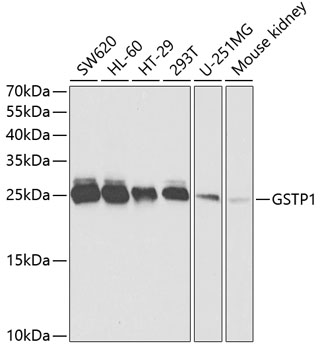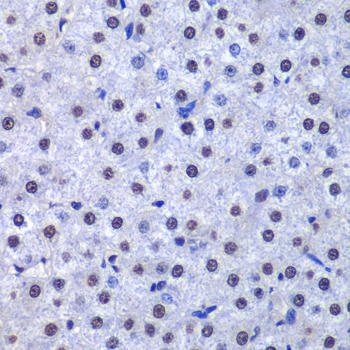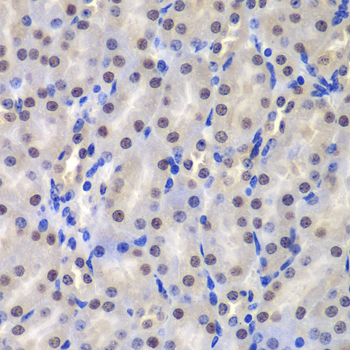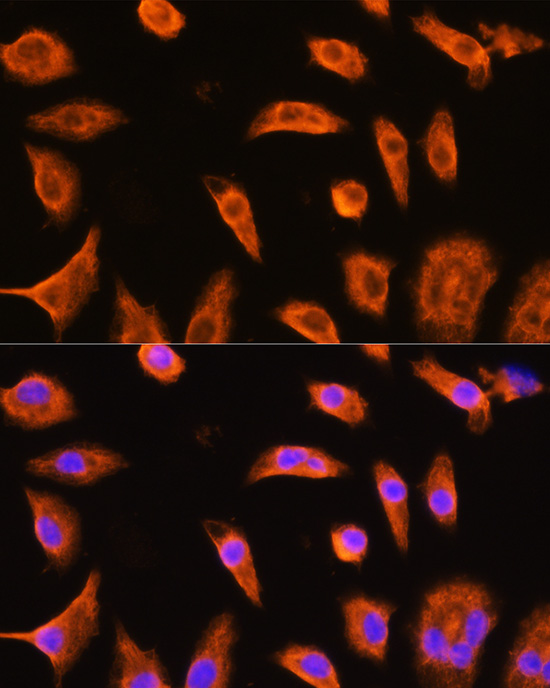Cell Biology Antibodies 9
Anti-GSTP1 Antibody (CAB5691)
- SKU:
- CAB5691
- Product Type:
- Antibody
- Reactivity:
- Human
- Reactivity:
- Mouse
- Host Species:
- Rabbit
- Isotype:
- IgG
- Antibody Type:
- Polyclonal Antibody
- Research Area:
- Cell Biology
Description
| Antibody Name: | Anti-GSTP1 Antibody |
| Antibody SKU: | CAB5691 |
| Antibody Size: | 20uL, 50uL, 100uL |
| Application: | WB IHC IF |
| Reactivity: | Human, Mouse |
| Host Species: | Rabbit |
| Immunogen: | Recombinant fusion protein containing a sequence corresponding to amino acids 1-210 of human GSTP1 (NP_000843.1). |
| Application: | WB IHC IF |
| Recommended Dilution: | WB 1:500 - 1:2000 IHC 1:50 - 1:200 IF 1:50 - 1:200 |
| Reactivity: | Human, Mouse |
| Positive Samples: | SW620, HL-60, HT-29, 293T, U-251MG, Mouse kidney |
| Immunogen: | Recombinant fusion protein containing a sequence corresponding to amino acids 1-210 of human GSTP1 (NP_000843.1). |
| Purification Method: | Affinity purification |
| Storage Buffer: | Store at -20'C. Avoid freeze / thaw cycles. Buffer: PBS with 0.02% sodium azide, 50% glycerol, pH7.3. |
| Isotype: | IgG |
| Sequence: | MPPY TVVY FPVR GRCA ALRM LLAD QGQS WKEE VVTV ETWQ EGSL KASC LYGQ LPKF QDGD LTLY QSNT ILRH LGRT LGLY GKDQ QEAA LVDM VNDG VEDL RCKY ISLI YTNY EAGK DDYV KALP GQLK PFET LLSQ NQGG KTFI VGDQ ISFA DYNL LDLL LIHE VLAP GCLD AFPL LSAY VGRL SARP KLKA FLAS PEYV NLPI NGNG KQ |
| Gene ID: | 2950 |
| Uniprot: | P09211 |
| Cellular Location: | Cytoplasm, Mitochondrion, Nucleus |
| Calculated MW: | 23kDa |
| Observed MW: | 25kDa |
| Synonyms: | DFN7, FAEES3, GST3, GSTP, HEL-S-22, PI, GST3 / GSTP1, GSTP1 |
| Background: | Glutathione S-transferases (GSTs) are a family of enzymes that play an important role in detoxification by catalyzing the conjugation of many hydrophobic and electrophilic compounds with reduced glutathione. Based on their biochemical, immunologic, and structural properties, the soluble GSTs are categorized into 4 main classes: alpha, mu, pi, and theta. This GST family member is a polymorphic gene encoding active, functionally different GSTP1 variant proteins that are thought to function in xenobiotic metabolism and play a role in susceptibility to cancer, and other diseases. |
| UniProt Protein Function: | GSTP1: Conjugation of reduced glutathione to a wide number of exogenous and endogenous hydrophobic electrophiles. Regulates negatively CDK5 activity via p25/p35 translocation to prevent neurodegeneration. Homodimer. Interacts with CDK5. Belongs to the GST superfamily. Pi family. |
| UniProt Protein Details: | Protein type:Transferase; EC 2.5.1.18; Xenobiotic Metabolism - drug metabolism - cytochrome P450; Xenobiotic Metabolism - metabolism by cytochrome P450; Other Amino Acids Metabolism - glutathione Chromosomal Location of Human Ortholog: 11q13 Cellular Component: extracellular space; mitochondrion; cytoplasm; plasma membrane; intracellular; cytosol; nucleus; vesicle Molecular Function:JUN kinase binding; protein binding; glutathione transferase activity; kinase regulator activity Biological Process: negative regulation of MAP kinase activity; negative regulation of JNK activity; central nervous system development; negative regulation of MAPKKK cascade; negative regulation of acute inflammatory response; negative regulation of tumor necrosis factor production; negative regulation of interleukin-1 beta production; negative regulation of I-kappaB kinase/NF-kappaB cascade; negative regulation of stress-activated MAPK cascade; regulation of stress-activated MAPK cascade; negative regulation of biosynthetic process; response to reactive oxygen species; glutathione metabolic process; negative regulation of nitric-oxide synthase biosynthetic process; negative regulation of fibroblast proliferation; positive regulation of superoxide release; xenobiotic metabolic process; negative regulation of protein kinase activity; negative regulation of apoptosis |
| NCBI Summary: | Glutathione S-transferases (GSTs) are a family of enzymes that play an important role in detoxification by catalyzing the conjugation of many hydrophobic and electrophilic compounds with reduced glutathione. Based on their biochemical, immunologic, and structural properties, the soluble GSTs are categorized into 4 main classes: alpha, mu, pi, and theta. This GST family member is a polymorphic gene encoding active, functionally different GSTP1 variant proteins that are thought to function in xenobiotic metabolism and play a role in susceptibility to cancer, and other diseases. [provided by RefSeq, Jul 2008] |
| UniProt Code: | P09211 |
| NCBI GenInfo Identifier: | 121746 |
| NCBI Gene ID: | 2950 |
| NCBI Accession: | P09211.2 |
| UniProt Secondary Accession: | P09211,O00460, Q15690, Q5TZY3, |
| UniProt Related Accession: | P09211 |
| Molecular Weight: | 23,356 Da |
| NCBI Full Name: | Glutathione S-transferase P |
| NCBI Synonym Full Names: | glutathione S-transferase pi 1 |
| NCBI Official Symbol: | GSTP1 |
| NCBI Official Synonym Symbols: | PI; DFN7; GST3; GSTP; FAEES3; HEL-S-22 |
| NCBI Protein Information: | glutathione S-transferase P; GSTP1-1; GST class-pi; deafness, X-linked 7; epididymis secretory protein Li 22; fatty acid ethyl ester synthase III |
| UniProt Protein Name: | Glutathione S-transferase P |
| UniProt Synonym Protein Names: | GST class-pi; GSTP1-1 |
| Protein Family: | Glutathione S-transferase |
| UniProt Gene Name: | GSTP1 |
| UniProt Entry Name: | GSTP1_HUMAN |








![GSTP1 Monoclonal Antibody [PAT12C10AT] (CPAB0272) GSTP1 Monoclonal Antibody [PAT12C10AT] (CPAB0272)](https://cdn11.bigcommerce.com/s-rd6ounxcu2/images/stencil/590x590/products/58496/63678/gstp1-monoclonal-antibody-pat12c10at-cpab0272__57356__03581.1706535032.jpg?c=1)

